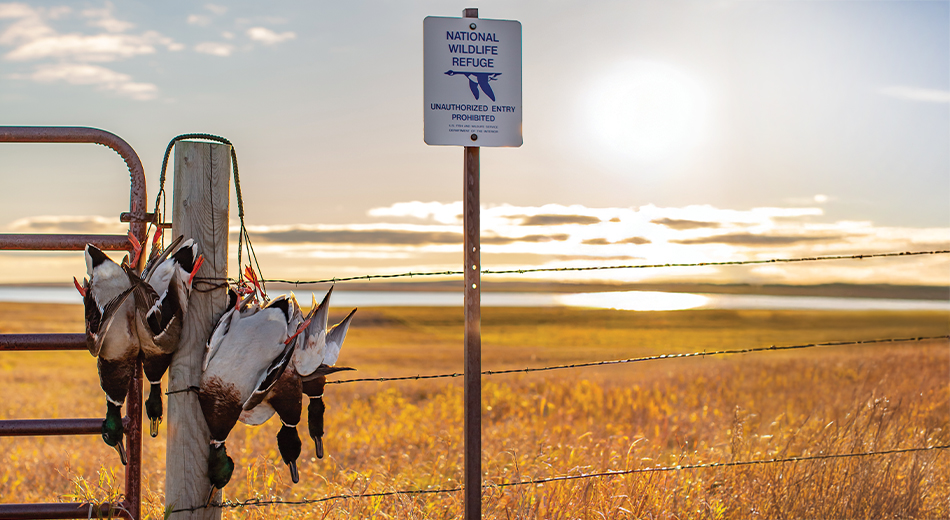
Delta Waterfowl Launches Major Initiative to Restore U.S. Wildlife Refuges
Our goal is to improve waterfowl hunting throughout North America by investing more resources into public lands
BISMARCK, NORTH DAKOTA — Delta Waterfowl is launching Restoring Our Refuges, an impactful advocacy campaign to secure enhanced public funding to revitalize the health and waterfowl value of federal refuges and state-owned wildlife management areas throughout the United States.
The 573 national wildlife refuges throughout the United States, which encompass 95 million acres of land and 760 million marine acres, serve as critical assets for the continent’s waterfowl and waterfowl hunters. Refuges provide important waterfowl nesting habitat in the prairies and other key breeding grounds, as well as foraging and loafing habitat along migration routes and at wintering areas. In addition, U.S. federal refuges host an estimated 2.6 million hunting days each year.
The National Wildlife Refuge System is ailing because deep reductions in staffing and maintenance budgets have led to a backlog of failing infrastructure. Funding in the U.S. Fish and Wildlife Service budget to operate the NWR System has declined 35% or more since 2010. The NWR System has lost 711 full-time staff since 2011, a 29% workforce reduction. To compensate, many NWRs have been clustered into complexes to stretch staff over several refuges, resulting in decreased time and ability for biologists and staff to manage habitat effectively on each property.
“To keep refuges running well, you need efficient water delivery and fairly intensive management to maximize habitat productivity,” said John Devney, Delta’s chief policy officer. “In too many cases, there’s not the staff or infrastructure to do it.”
During the COVID-19 pandemic shutdown in early 2020, Delta helped to identify more than $250 million in “deferred maintenance” on priority waterfowl and wetland projects within the NWR System. Over the broader NWR System, the shortfall of unmet infrastructure needs is an estimated $2.6 billion. Both deficits likely have increased since 2020.
Delta’s Restoring Our Refuges initiative aims to increase funding for refuges in the federal budget and to work with Congressional appropriators to ensure the money is spent to improve wetland and waterfowl habitat.
“It’s about improving habitat, but it’s also about significantly improving hunting opportunity,” Devney said. “Since the majority of the federal refuges were acquired using duck stamp dollars, and duck stamp dollars come from duck hunters, those resources should go back to improving conditions for ducks and duck hunters.”
In addition, Delta will continue to work with USFWS staff at all levels to increase waterfowl hunting opportunities on priority refuges. Delta’s advocacy work during the past decade has directly led to significant new public waterfowl hunting opportunities across the United States.
“When we talk about hunting opportunity, the value is in opportunity to high-quality habitat,” Devney said. “It’s not just being able to go through the gate, it’s going through the gate and having a chance to see and shoot a few ducks.”
Restoring Our Refuges also strives to address waterfowl habitat and hunting opportunities on state-owned lands, enlisting the help of Delta’s chapter volunteers to amplify the effort.
“We’re asking our members and volunteers help engage in this topic to help drive the investment back into public lands — both at wildlife management areas and refuges,” Devney said.
Last month, Jason Tharpe, Delta’s chief executive officer, met with Doug Burgum, the U.S. Secretary of the Interior at the White House during a conservation leadership forum to provide input regarding the management of public lands.
“The discussion emphasized aligning conservation outcomes with federal land management priorities,” Tharpe said. “Delta Waterfowl was at the table to ensure the perspectives of waterfowl hunters were represented and heard.”
Tharpe, a native of Louisiana, keenly understands the perspectives and challenges of being a duck hunter who relies on public properties to provide good opportunities.
“We understand how bad things have become on our public hunting lands,” Tharpe said. “We’re talking about a legacy of conservation. As waterfowl hunters, our refuge system is the flagship.”
Restoring Our Refuges is a major effort to improve waterfowl hunting throughout North America by investing more resources into our public lands.
“It’s a challenge,” Tharpe said. “I think it’s a matter of putting some attention to it and getting our policy makers focused on the right things. I think we’ve lost a bit of focus on game management in North America, and it’s been replaced by ecosystem management, species at-risk, endangered species management. Those are valuable things. But we need game management. It must be part of the system, especially in a system largely supported by hunters. Delta Waterfowl is committed to leveraging our resources to ensure it happens.”
Delta Waterfowl is The Duck Hunters OrganizationTM, a leading conservation group working to produce ducks and secure the future of waterfowl hunting in North America. Visit deltawaterfowl.org.
For more information, contact John Devney at jdevney@deltawaterfowl.org.
